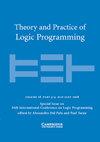定量答案集规划中不完全信息的规划
IF 1.1
2区 数学
Q3 COMPUTER SCIENCE, SOFTWARE ENGINEERING
引用次数: 6
摘要
摘要给出了答案集规划(ASP)中不完全信息规划的一般方法。更准确地说,我们考虑一致性和条件规划的问题与传感行动和假设。我们使用一个简单的形式来表示规划问题,其中逻辑程序描述状态、初始状态和目标状态之间的过渡函数。为了解决计划问题,我们使用量化答案集规划(QASP),它是ASP的扩展,具有原子上的存在量词和全称量词,类似于量化布尔公式(QBFs)。我们定义了量化逻辑程序的语言,并用它来表示一致性和条件规划的不同变体的解。在实践方面,我们提出了一个基于翻译的QASP求解器,它将量化的逻辑程序转换为QBF,然后执行QBF求解器,并在一致性和条件规划基准上对该方法进行了实验评估。本文章由计算机程序翻译,如有差异,请以英文原文为准。
Planning with Incomplete Information in Quantified Answer Set Programming
Abstract We present a general approach to planning with incomplete information in Answer Set Programming (ASP). More precisely, we consider the problems of conformant and conditional planning with sensing actions and assumptions. We represent planning problems using a simple formalism where logic programs describe the transition function between states, the initial states and the goal states. For solving planning problems, we use Quantified Answer Set Programming (QASP), an extension of ASP with existential and universal quantifiers over atoms that is analogous to Quantified Boolean Formulas (QBFs). We define the language of quantified logic programs and use it to represent the solutions different variants of conformant and conditional planning. On the practical side, we present a translation-based QASP solver that converts quantified logic programs into QBFs and then executes a QBF solver, and we evaluate experimentally the approach on conformant and conditional planning benchmarks.
求助全文
通过发布文献求助,成功后即可免费获取论文全文。
去求助
来源期刊

Theory and Practice of Logic Programming
工程技术-计算机:理论方法
CiteScore
4.50
自引率
21.40%
发文量
40
审稿时长
>12 weeks
期刊介绍:
Theory and Practice of Logic Programming emphasises both the theory and practice of logic programming. Logic programming applies to all areas of artificial intelligence and computer science and is fundamental to them. Among the topics covered are AI applications that use logic programming, logic programming methodologies, specification, analysis and verification of systems, inductive logic programming, multi-relational data mining, natural language processing, knowledge representation, non-monotonic reasoning, semantic web reasoning, databases, implementations and architectures and constraint logic programming.
 求助内容:
求助内容: 应助结果提醒方式:
应助结果提醒方式:


